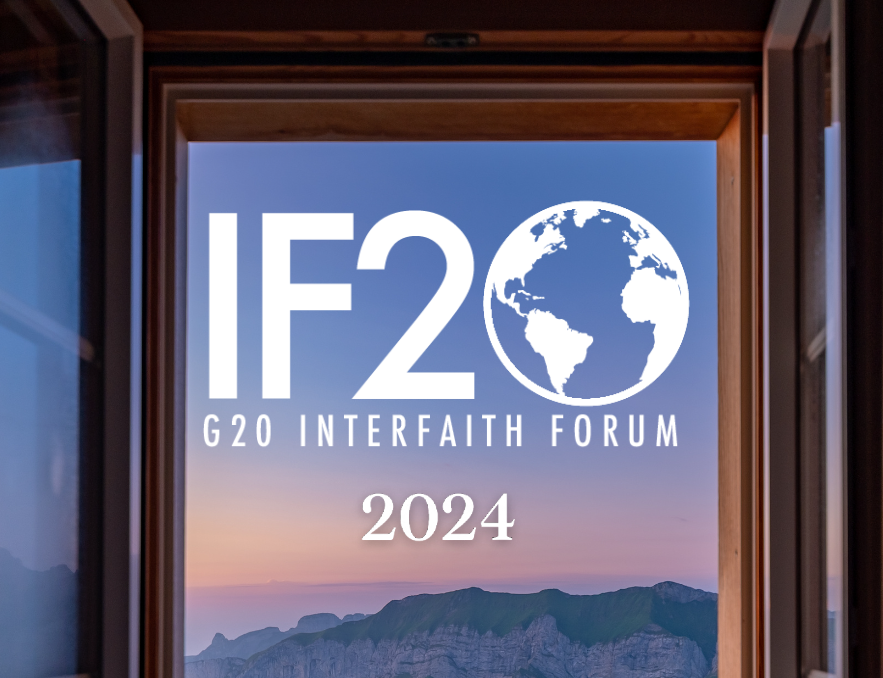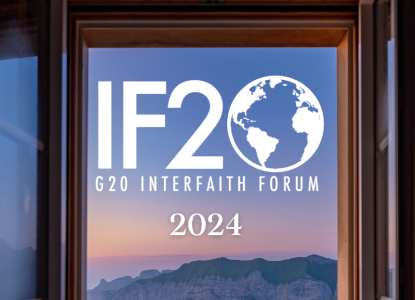By Marianna Richardson
— —

The symbol of windows is used throughout literature and religious works. Lewis Carroll’s “Through the Looking-Glass” or the prophet Malachi’s reference to the “windows of heaven” (Malachi 3:10) illustrate how the symbol of windows is used to reference a new perspective for those who look through them.
In the 2024 Year-End Report for G20 Interfaith Forum, the motif of windows runs throughout the report. By observing the world through a window of hope, we reflect on past and present issues, fostering a deeper awareness and commitment to address them. This underscores the importance of broadening our view to inspire action and transformation.
The G20 Interfaith Forum (IF20) theme for 2024 was “Leave No One Behind: The Well-Being of the Planet and Its People.” IF20’s five policy priority areas included the following:
- Food Security on the Alliance against Hunger
- Environment: Interfaith Action to Protect Rainforests
- Peacebuilding and Social Cohesion Challenges: Focusing on Religious Literacy
- Debt Relief: Economic and Financial Imperatives for “Leaving No One Behind”
- Human Trafficking and Modern Slavery: Partnerships for Solutions
G20 Brazil 2024 picked themes that also focused on the most vulnerable in society: 1. Hunger, 2. Sustainability and climate, and 3. Transforming global governance. Brazil’s addition of the G20 Social allowed more voices to be heard at the G20 Summit.
The IF20 five policy priorities and Brazil’s three focus areas exemplify the hope G20 countries have that they can change the world. Apostle Paul’s poetic statement that “for now we see through a glass darkly” (1 Corinthians 13:12) illustrates the difficulties people of the world have in viewing their own problems, as well as the problems of others. But the symbol of looking through a window indicates that people are trying to gain a perspective on the world’s problems and issues. People are willing to look outside their own four walls and see the problems of others and try to find permanent solutions.
As philosopher John Stuart Mill stated, “He who knows only his side of the case knows little of that.” The people of the world must look outside their borders to understand how others’ problems affect their own existence because we are all interconnected. This perspective of looking outside encourages empathy and understanding, which is essential for meaningful change.
In this year-end report, there are short summaries of IF20 events and webinars. Data visualizations will illustrate the numbers of people who have been a part of these events, and the numbers of people who have attended our webinars, visited our website, and received our newsletters. IF20’s communication outreach tries to help others see and consider world issues and problems.
As we look forward to G20 South Africa 2025, we shall view the world through a new window. G20 South Africa has chosen three new focus areas: 1. Solidarity, 2. Equality, and 3. Sustainability. While focusing on these three areas, the IF20 will still emphasize the needs of the most vulnerable in society. During our regional meetings, forums, and webinars in 2025, we hope to find solutions that will leave no one behind.
Read the complete 2024 Year-End Report here [Download PDF]. This comprehensive document provides detailed insights into IF20’s initiatives, achievements, and impact throughout the year, offering readers a deeper understanding of our global engagement and policy recommendations.
– – –
Marianna Richardson is the Director of Communications for the G20 Interfaith Forum. She is also an adjunct professor at the Marriott School of Business at Brigham Young University.


